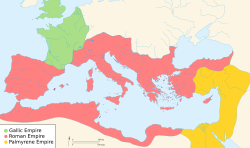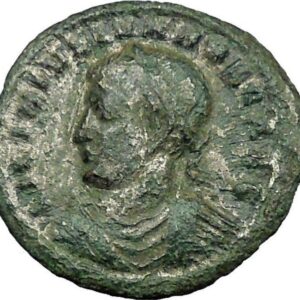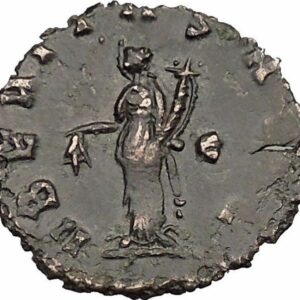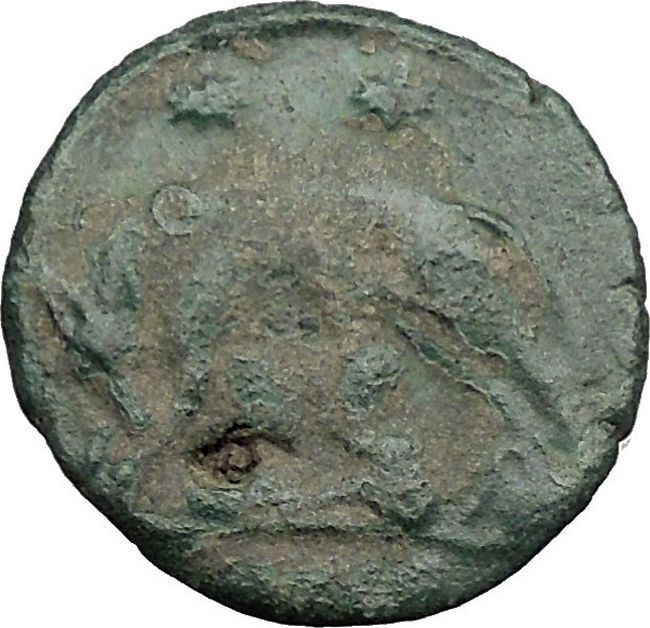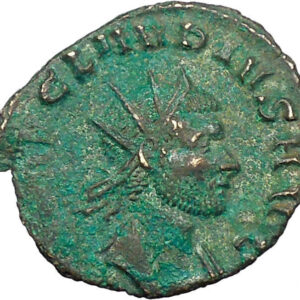|
Tetricus I – Gallic Roman Emperor: 271-274 A.D. –
Bronze Antoninianus 20mm (3.37 grams) Struck circa 271-274 A.D.
Reference: RIC 148
IMPCTETRICVSPFAVG – Radiate, draped and cuirassed bust right.
VIRTVSAVGG – Virtus standing left, resting hand on shield and holding spear.
You are bidding on the exact
item pictured, provided with a Certificate of Authenticity and Lifetime
Guarantee of Authenticity.
Virtus was a specific
virtue
in
Ancient Rome
. It carries connotations of valor,
manliness, excellence, courage, character, and worth, perceived as masculine
strengths (from Latin
vir, “man”). It was thus a
frequently stated virtue of
Roman emperors
, and was personified
as a deity
.
Origins
The origins of the word virtus can be traced back to the Latin word
vir, “man”. The common list of attributes associated with virtus are
typically perceived masculine strengths, which may indicate its derivation from
vir. From the early to the later days of the Roman Empire, there appears
to have been a development in how the concept was understood.
Originally virtus was used to describe specifically martial courage,
but it eventually grew to be used to describe a range of Roman virtues. It was
often divided into different qualities including prudentia (prudence),
iustitia
(justice),
temperantia
(temperance,
self-control), and
fortitudo
(courage). This division of
virtue as a whole into
cardinal virtues
is today classified as
virtue ethics
, as described by
Plato
‘s
Republic
and
Aristotle
‘s
Nicomachean Ethics
. It implies a link
between virtus and the Greek concept of
arete
.
This inclusion leads to the belief that at one time virtus extended to
cover a wide range of meanings that covered one general ethical ideal. The use
of the word began to grow and shift to fit the new idea of what manliness meant.
No longer did virtus mean that a person was a brave warrior but it could
also mean that he was a good man, someone who did the right thing. During the
time of the decline of the Roman elite virtus the Roman upper class no
longer thought of themselves as unmanly if they did not serve in the military.
Virtue as described by Aristotle was rediscovered in the medieval age by
Muslim
philosopher
Averroes
, which in turn impacted
Thomas Aquinas
to fuse virtue ethics with
Christianity in connection with the
Renaissance of the 12th century
.
In Roman
political philosophy
Virtus comes from the aristocratic tradition in which it is a specific
type of public conduct. It is really only applicable in the
cursus honorum
, certainly by the late
republic at least. It is not a “private” virtue in the way that modern people
might consider it. Valor, courage, and manliness are not things that can be
pursued in the private sphere of the individual or the individual’s private
concerns. There could be no virtue in exploiting one’s manliness in the pursuit
of personal wealth, for example. virtus is exercised in the pursuit of
gloria for the benefit of the
res publica
resulting in the winning of
eternal “memoria.” According to D.C. Earl “Outside the service of the res
publica there can be no magistratus and therefore, strictly speaking,
no gloria, no nobilitas, no virtus“.
For the nobility virtus lies not only in one’s personal “acta” but
also that of one’s ancestors. However Cicero, a
novus homo
, asserted that virtus was
a virtue particularly suited to the new man just as nobilitas was suited to the
noble. Cicero argued that just as young men from noble families won the favor of
the people so too should the novus homo earn the favor of the people with his
virtus. He even extended the argument that virtus and not one’s
family history should decide a man’s worthiness. Virtus is something that
a man earns himself, not something that is given to him by his family, thus it
is a better measure of a man’s ability. Cicero’s goal was not to impugn the
noble class but widen it to include men who had earned their positions by merit.
The term was used quite significantly by the historian
Sallust
, a contemporary of Cicero. Sallust
asserted that it did not rightfully belong to the nobilitas as a result
of their family background but specifically to the
novus homo
through the exercise of
ingenium (talent). For Sallust and Cicero alike, virtus is situated
in the winning of glory by the execution of illustrious deeds (egregia
facinora) and the observance of right conduct through bonae artes.
Who could have it?
Virtus was not universally applicable to just anyone – generally
(although not always exclusively) only adult male Roman citizens would be
thought of as possessing virtus.
Women
Virtus was rarely to women, likely because of its association with
vir. The highest regarded female virtue was pudicitia: “modesty” or
“chastity”. Cicero
, however, attributes this characteristic
to females several times. He uses it once to describe
Caecilia Metella
when she helps a man who is
being chased by assassins. Twice more he uses it when describing his daughter,
Tullia
, portraying her in his letters as brave
in his absence. He uses it again to describe his first wife
Terentia
during his exile. Livy in Book 2
attributes it to Cloelia.
Children
Virtus was not a term commonly used to describe children. Since
virtus was primarily attributed to a full grown man who had served in the
military, children were not particularly suited to obtain this particular
virtue.
Slaves
While a
slave
was able to be homo (“man”) he was
not considered a vir. Slaves were often referred to as puer (Latin
for boy) to denote that they were not citizens. Since a slave could not
be a vir it follows that they would not be allowed to have the quality of
virtus. Once a slave was manumitted he was able to become a vir
and he was also classified as a freedman but this did not allow him to have
virtus. A good slave or freedman was said to have fides, but no
virtus.
Foreigners
Foreigners
in the Roman world could be
attributed with virtus: If they fought bravely they could be said to have
virtus. Virtus could also be lost in battle. Virtus could
even be a cause to gain citizenship as in the case of Spanish cavalry men
granted citizenship by Cn. Pompeius Strabo in 89 B.C.E. for their virtus
in battle.
How was it used?
Virtus applies exclusively to a man’s behaviour in the public sphere,
i.e. to the application of duty to the
res publica
in the
cursus honorum
. His private business was no
place to earn virtus, even when it involved courage or feats of arms or
other qualities associated to it if performed for the public good.
In private
While in many cultures around the world it is considered “manly” to father
and provide for a family, family life was considered in the Roman world to be
part of the private sphere. During this time there was no place for virtus
in the private sphere. Most uses of virtus to describe any part of
private life are ambiguous and often refer to another similar quality.[11]
In the Roman world the oldest living patriarch of the family was called the
pater familias
and this title implied that
he was able to make all legal and binding decisions for the family; he also
owned all the money, land, and other property. His wife, daughters, sons, and
his sons’ families were all under his
potestas
. The only time a son was seen as
separate from his father’s control in the eyes of other Romans was when he
assumed his public identity as a citizen. He could earn his virtus by
serving in the military, and thus could only demonstrate manliness outside of
the family setting. This is another reason that virtus is not often used
to describe the Roman private life.
In public
Virtus was a crucial component for a political career. Its broad
definition led to it being used to describe a number of qualities that the Roman
people idealized in their leaders.
In everyday life a typical Roman, especially a young boy, would have been
inculcated with the idea of virtus. Since military service was a part of
most Roman men’s life, military training would have started fairly early. Young
boys would have learned how to wield weapons and military tactics starting at
home with their fathers and older male relatives and later in school. Also as a
young boy one would have heard numerous stories about past heroes, battles, and
wars. Some of these stories would have surely told of the virtus of past
heroes, and even family members. Publicly it was easy to see the rewards of
virtus. Public triumphs were held for victorious generals and rewards were
given to brave fighters. All of this propaganda would have encouraged young boys
coming into their manhood to be brave fighters and earn the attribute of
virtus. It was the duty of every generation of men to maintain the
dignitas
which his family had already
earned and enlarge it. This pressure to live up to the standards of one’s
ancestors was great. In achieving virtus one could achieve
gloria
. By gaining virtus and
gloria one could hope to aspire to high political office and great renown.
While young boys were encouraged to earn virtus there were also limits
put on showing virtus in public. Virtus was often associated with
being aggressive[citation
needed] and this could be very dangerous in the
public sphere and the political world. Displays of violent virtus were
controlled through several methods. Men seeking to hold political office
typically had to follow the
cursus honorum
. Many political offices had
an age minimum which ensured that the men filling the positions had the proper
amount of experience in the military and in government. This meant that even if
a man proved himself capable of filling a position or was able to persuade
people that he was capable, he would not necessarily be able to hold the
position until he had reached a certain age. This also served to ensure that in
elections of public offices no one had a certain advantage over another person
because by the time most men went into public office they would have retired
from military service. Furthermore, before any Roman soldier could partake in
single combat he had to gain permission from his general. This procedure was
meant to keep soldiers from putting themselves in extremely dangerous situations
that they may or may not have been able to handle in order gain virtus.
The concept of virtus also tended to be a concept of morality as far
as politics were concerned. This could range from the very literal definition of
manliness seen in aggression and the ruthless acquisition of money, land, and
power, or the lighter, more idealistic political meaning which almost took on
the extended meaning of “pietas”, a man who was morally upright and concerned
with the matters of the state. Plautus in
Amphitruo
contrasted virtus and
ambitio. Virtus is seen as a positive attribute, though ambitio
itself is not necessarily a negative attribute but is often associated with
negative methods such as bribery.
Plautus
said that just as great generals and
armies win victory by virtus, so should political candidates. Ambitio
“is the wrong method of reaching a good end.” Part of virtus, in the
political sphere was to deal justly in every aspect of one’s life, especially in
political and state matters.
Military
Although the two concepts are related, virtus, for the Roman, did not
necessarily emphasize the behavior that the associations of the present-day
English term ‘virtue’ suggest. Virtus was to be found in the context of
‘outstanding deeds’ (egregia facinora), and brave deeds were the
accomplishments which brought gloria (‘a reputation’). This gloria
was attached to two ideas: fama (‘what people think of you’) and
dignitas (‘one’s standing in the community’). The struggle for virtus
in Rome was above all a struggle for public office (honos), since it was
through aspiring to high office, to which one was elected by the People, that a
man could best show his manliness by means of military achievement which would
in turn cultivate a reputation and votes. It was the duty of every aristocrat
and would-be aristocrat to maintain the dignitas which his family had
already achieved and to extend it to the greatest possible degree, through
higher political office and military victories. This system resulted in a strong
built-in impetus in Roman society to engage in military expansion and conquest
at all times.
Sexuality
While in many cultures the virtue of manliness is also seen as being partly
sexual, in the Roman world virtus apparently did not have sexual
connotations. Similar words deriving from the same stem often have sexual
connotations. In the Roman world virtus dealt with a great many areas
such as martial courage, honor, and being morally upright rather than sexual
manliness.
Examples
One of the most well known demonstrations of virtus was shown by
Lucius Quinctius Cincinnatus
. Before
Cincinnatus was appointed dictator in 458 BCE, Rome was in the midst of a battle
with the Aequi
and needed someone to take control.
Messengers sent to fetch him found him plowing in his field. Upon being informed
of the appointment, he wept saying, “So my field will be unsown this year, and
we shall be in danger of not having enough food to support us.”[16]
Nevertheless, he dutifully gathered his things, kissed his wife goodbye and
departed to raise an army and defeat the Aequi in a mere fifteen days. Upon
returning home after the victory, Cincinnatus picked up the plough from where he
left it and began plowing again.
Dionysius of Halicarnassus
recounts this story
to illustrate the type of leaders the men of Rome were. He says that they
“worked with their hands, led self-disciplined lives, did not complain about
honorable poverty, and far from pursuing positions of royal power.”
Pompey
is another prominent example of
virtus. In 55 BCE, Pompey inaugurated his grand theatre complex and
dedicated several shrines to different gods, one of these being Virtus.
This consecrated Pompey’s link with virtus. He gained a reputation with
the public as being a man of virtus. Cicero, throughout his speech, the
De imperio Cn. Pompei, connects Pompey with “divina virtus”.[18]
Pompey was so closely connected with virtus that once during a production
of a play at the
Ludi Apollinares
one of the characters
spoofed Pompey by stating “eandem virtutem istam veniet tempus cum graviter
gemes”: “The time will come when you bitterly resent that same virtus“.
The audience did not need to hear his name to know that Pompey was being
referenced.
Marcellus and the
Temple
M. Claudius Marcellus
, during the battle of
Clastidium
in 222 BCE, dedicated a temple to
Honos
and Virtus. This was one of the first
times that Virtus had been recognized as divine. The connection with
Honos would have been obvious to most Romans as demonstrations of virtus
led to election to public office and both were considered honos. The cult
of Honos was already a long-standing tradition in Rome. The marriage of
the two deities ensured that Virtus would also get proper respect from
the Romans. But an objection by the pontiffs was that one temple could not
properly house two gods because there would be no way of knowing which god to
sacrifice to should a miracle happen in the temple.
Caius Pius Esuvius Tetricus was Emperor of the
Gallic Empire
(Imperium Galliarum) from 270/271 to 273, following the
murder of Victorinus
. Tetricus, who ruled with his son, Tetricus II, was the last of
the Gallic emperors.
Tetricus was born to a noble family and held the administrative rank of
praeses provinciae
(provincial governor) of
Aquitania
at
the time of Victorinus
‘ death. Victorinus’ mother,
Victoria
, paid the army heavily to declare Tetricus emperor near Burdigalia
(Bordeaux,
France
), which
was approved in Gaul
and Britain
. Following his appointment, Tetricus repelled Germanic tribes that
took advantage of the confusion following the death of Victorinus to invade.
Tetricus installed his capital at Augusta Treverorum (present
Trier
,
Germany
, near
the vital Rhine border, hence later seat of a
Tetrarch
)
and appointed his son,
Tetricus
II
,
Caesar
(273). Tetricus made no attempts to expand the Gallic Empire,
other than southward, regaining
Aquitania
(which had rejoined the Roman empire during the reign of
Claudius
Gothicus
). In late 273 or early 274,
Faustinus
,
provincial governor of
Gallia Belgica
,
rebelled against him in
Augusta Treverorum
.
In 273, Emperor
Aurelian
set out to reconquer the western Roman empire, following his victories in the
east. Tetricus took his army southward from Trier to meet Aurelian, who was
advancing into northern Gaul. The
decisive battle
took place near
Châlons-sur-Marne
, where Tetricus and his son surrendered to Aurelian.
According to literary sources, after being displayed as trophies at
Aurelian’s
triumph
in Rome, the lives of Tetricus and his son were spared by Aurelian,
and Tetricus was even given the title of
corrector
Lucaniae et Bruttiorum, that is governor of a southern region of
Italia
. Tetricus died at an unknown date in Italy; he is listed as one of
Rome’s
Thirty Tyrants
in the
Historia Augusta
.
The Gallic Empire (Latin:
Imperium Galliarum) is the modern
name for a breakaway part of the
Roman Empire
that functioned de facto as
a separate state from 260 to 274.It originated during the
Crisis of the Third Century
.
The Gallic Empire under
Tetricus I
by 271 A.D. (in green)
It was established by
Postumus
in 260 in the wake of
barbarian
invasions and instability in
Rome, and at its height included the territories of
Germania
,
Gaul
,
Britannia
, and (for a time)
Hispania
. After Postumus’ assassination in 268
it lost much of its territory, but continued under a number of emperors and
usurpers. It was retaken by
Roman emperor
Aurelian
after the
Battle of Châlons
in 274.
History
Origins
The Roman
Crisis of the Third Century
continued as
Emperor
Valerian
was defeated and captured by the
Sassanid Empire
of
Persia
, leaving his son
Gallienus
in very shaky control. Shortly
thereafter, the
Palmyrene Empire
, which came to encompass
Egypt
,
Syria
,
Judea
, and
Arabia Petraea
also broke away.
The governors in
Pannonia
staged unsuccessful local revolts. The
Emperor left for the Danube to attend to their disruption. This left
Postumus
, who was governor of
Germania Superior
and
Inferior
, in charge at the Rhine border. An
exeptional administrator, Postumus had also protected the Germania Inferior
against an invasion led by the Franks in the summer of 260 very well. In fact,
Postumus defeated the Frankish forces at Empel so decisively, that there would
be no further Germanic raids for 10 years. This all would have combined to make
Postumus one of the most powerful men in the west of the Roman empire.
The imperial heir
Saloninus
and the praetorian prefect Silvanus
remained at Colonia Agrippina (Cologne),
to keep the young heir out of danger and perhaps also as a check on Postumus’
ambitions. Before long, however, Postumus besieged Colonia Agrippina and put the
young heir and his guardian to death, making his revolt official. Postumus is
thought to have established his capital at Cologne or Trier,[2]
with Lugdunum also becoming an important city in the empire.
The Gallic Empire had its own praetorian guard, two annually elected consuls
(not all of whose names have survived) and probably its own senate. According to
the numismatic evidence, Postumus himself held the office of consul five times.
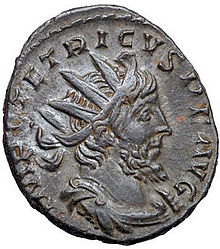
Coin of
Tetricus
, last emperor (271–274) of
the Gallic Empire
Postumus successfully fended off a military incursion by Gallienus in 263,
and was never challenged by him again. However, in early 268 he was challenged
by Laelianus
, probably one of his commanders, who
was declared emperor at Mogontiacum (Mainz)
by his
Legio XXII Primigenia
. Postumus quickly retook
Mogontiacum and Laelianus was killed. Postumus himself, however, was overthrown
and killed by his own troops, reportedly because he did not allow them to sack
the city.[3][4]
After Postumus
After the death of Postumus, the Gallic Empire began to decline. Roman
Emperor
Claudius Gothicus
re-established Roman
authority in
Gallia Narbonensis
and parts of
Gallia Aquitania
, and there is some evidence
that the provinces of Hispania, which did not recognize the subsequent Gallic
Emperors, may have re-aligned with Rome then.[5][6]
Marius
was instated as Emperor upon Postumus’
death, but died very shortly after; ancient sources writing much later state
that he reigned only two days, though it is more likely, as displayed through
the numismatic record, that he reigned for a few months.[7]
Subsequently
Victorinus
came to power, being recognized as
Emperor in northern Gaul and Britannia, but not in Hispania.[5]
Victorinus spent most of his reign dealing with insurgencies and attempting to
recover the Gaulish territories taken by Claudius Gothicus. He was assassinated
in 271, but his mother
Victoria
took control of his troops and used
her power to influence the selection of his successor.[5]
With Victoria’s support,
Tetricus
was made Emperor, and was recognized
in Britannia and the parts of Gaul still controlled by the Empire.[8]
Tetricus fought off Germanic barbarians who had begun ravaging Gaul after the
death of Victorinus, and was able to re-take Gallia Aquitania and western Gallia
Narbonensis while Roman Emperor
Aurelian
was engaging Queen
Zenobia
‘s
Palmyrene Empire
in the east. He established
the imperial court at Trier
, and in 273 he elevated his son,
also named Tetricus
, to the rank of
Caesar
. The following year the younger Tetricus
was made co-consul, but the Empire grew weak from internal strife, including a
mutiny led by the usurper
Faustinus
.[8]
By that time Aurelian had defeated the Palmyrene Empire and had made plans to
re-conquer the west. He moved into Gaul and defeated Tetricus at the
Battle of Châlons
in 274; according to some
sources, Tetricus offered to surrender in exchange for clemency for him and his
son before the battle.[8]
This detail may be later propaganda, but either way, Aurelian was victorious,
and the Gallic Empire was effectively dismantled.[8]
Causes
The Gallic Empire was symptomatic of the fragmentation of power during the
third-century crisis. It has also been taken to represent autonomous trends in
the western provinces, including proto-feudalistic tendencies among the Gaulish
land-owning class whose support has sometimes been thought to have underpinned
the strength of the Gallic Empire, and an interplay between the strength of
Roman institutions and the growing salience of provincial concerns.[10]
One of Postumus’ primary objectives as emperor was evidently the defence of the
Germanic frontier; in 261 he repelled mixed groups of
Franks
and
Alamanni
to hold the Rhine
limes
secure (though lands beyond the upper
Rhine and Danube had to be abandoned to the barbarians within a couple of
years). In so doing, Postumus positioned himself avowedly as not only the
defender and restorer of Gaul, but also as the upholder of the Roman name.
The usurpation of power over Britain and northern Gaul by
Carausius
just twenty years later reflects a
continuing trend by which local loyalties from the landed aristocracy and
deteriorating morale in the legions enabled Carausius to seize power in Britain.[citation
needed] Similarly with the withdrawal of legions
after 408, many Britons desired a localized Roman authority rather than
nationalist revolt. The desire for Roman order and institutions was entirely
compatible with a degree of national or regional separatism.
Gallic Emperors
The Gallic Emperors are known primarily from the
coins they minted. The political and military history of the Gallic
Empire can be sketched through the careers of these emperors. Their names are as
follows:
- Postumus
260–268
-
Marius
268
- Victorinus
268–270
- (Domitianus
271? usurper)
- Tetricus the elder
[14]
270–274
-
Tetricus the younger
270–274 (son of
Tetricus;
caesar
)
Consuls of the
Gallic Empire
| Year |
Consul |
Consul |
| 260 |
Postumus
(second time) |
unknown |
| 261 |
Postumus (third time) |
| 262 |
unknown |
| 263 |
| 264 |
| 265 |
Postumus (fourth time) |
| 266 |
| 267 |
unknown |
| 268 |
Postumus (fifth time) |
Victorinus
(first time) |
| 269 |
unknown |
unknown |
| 270 |
Victorinus (second time) |
Sanctus |
| 271 |
Tetricus
(first time) |
unknown |
| 272 |
Tetricus (second time) |
| 273 |
Tetricus (third time) |
| Year and sequence unknown: |
| ? |
Censor (twice) |
Lepidus (twice) |
| ? |
Dialis |
Bassus |
| ? |
“Apr.” |
“Ruf.” |
|





